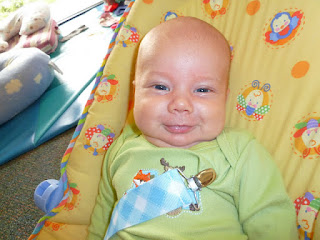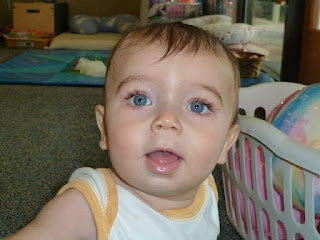We have all heard that breast is best when it comes to the nutrition of an infant. We may trust and believe this knowledge, but why? Why is breastfeeding the best form of nutrients for an infant? If breast is best, why are there so many formulas that are “as good as breastmilk”? What can we do to support this network of mothers and be advocates for breastfeeding?
Breastfeeding is a topic near to my heart because I am around it every day. Being an infant teacher, I am not only witnessing the relationship between a nursing mom and her baby, but I am also handling the precious milk and feeding it to the children several times a day. These are the faces of some of the breastfed babies in my classroom.
 |
| Kellan - 6 Weeks |
 |
| Kellan - 3 Months |
 |
| Kellan - 5 Months |
 |
| Kellan Today - 7 Months |
 |
| Ellis - 8 Weeks |
 |
| Ellis - 6 Months |
 |
| Ellis - 9 Months |
 |
| Ellis Today - 11 Months |
Breastfeeding was the norm pre-WWII. It was at this place in our country’s life when the men were away at war and the women had to get jobs outside of the home to support the homefront. This is when formula made it greatest strides. It was a way for working mothers to feed their babies without being near to breastfeed. Since then, formulas have been engineered to be much more similar to breastmilk. Alas, nothing is as good for a baby as mother’s milk. Breastmilk provides many benefits for baby that formula cannot - such as micronutrients not found in formula, better vision, protection against more childhood diseases, and reduced chances of obesity later in life. These benefits alone justify why breast is best.
People often talk about why breastfeeding is beneficial for babies, but less often discuss why breastfeeding is beneficial for mothers and families. A nursing mother has an easier time bonding with her baby, reduced risk of breast cancer and osteoporosis, satisfaction of meeting her infant’s needs, and natural contraception with exclusive breastfeeding for several months. It is also beneficial for the rest of the family because it does not have the financial burden that formula can have, it allows for easier travel, and it is less stressful on a father, especially at night because he cannot be expected to feed the baby.
Breastfeeding is a cultural aspect that differs around the world. After some research, I noticed that the more Westernized a country is, the lower the percentage of infants who are breastfed. Countries that are less Westernized are more open and accepting to this natural means of providing nourishment to infants.
Keeping the consistency of my former entries, I chose to research breastfeeding in Korea. It seems that breastfeeding is viewed theoretically as better for the baby, but unfortunately, Korean society does not provide much support for breastfeeding. Babies born in hospitals are often given formula immediately. Also, breastfeeding in public (discretely) is viewed as indecent and dirty. If breastfeeding is viewed as better for the baby, why is it not supported by society? Reasons for formula use are similar to that of American women – insufficient supply of breastmilk and mother’s employment (which are actually directly linked to each other).
Learning how unsupported mothers in other countries are when it comes to breastfeeding is disheartening. It is still something that is not 100% supported by American society. It is unlawful for an employee of a store or restaurant to ask a nursing mother to feed in a bathroom, yet how many moms end up doing just this? This is a result of staring, dirty looks from onlookers, and people talking poorly of breastfeeding. I personally consider breastfeeding to be one of my personal soapboxes and view myself as an advocate. Given a situation, I will preach, teach, and inform anyone willing to listen, striving for support from all.
Breast IS Best!!!








I agree with your point of view. I feel society has a double standard when it comes to breast feeding. Society contributes breast feeding to the overall health of children, but does not recognize the unique eating habits of developing infants frowning upon public breast feeding.
ReplyDeleteHi Rene,
ReplyDeleteThank you for supporting breastfeeding and protecting this unique relationship in your program. I also want to share an article with you, it is about the language we use about breastfeeding. It really helped me understand how crucial it was for moms to be supported in their breastfeeding journey. Here is a link: http://www.whale.to/a/wiessinger.html
Thank you too for sharing those pictures of healthy breastfed babies! How wonderful to see their little chunky cheeks :)
"it is less stressful on a father, especially at night because he cannot be expected to feed the baby. " .... could you explain this more? I don't know if i am interpreting it correctly. I'll see you tomorrow.
ReplyDelete